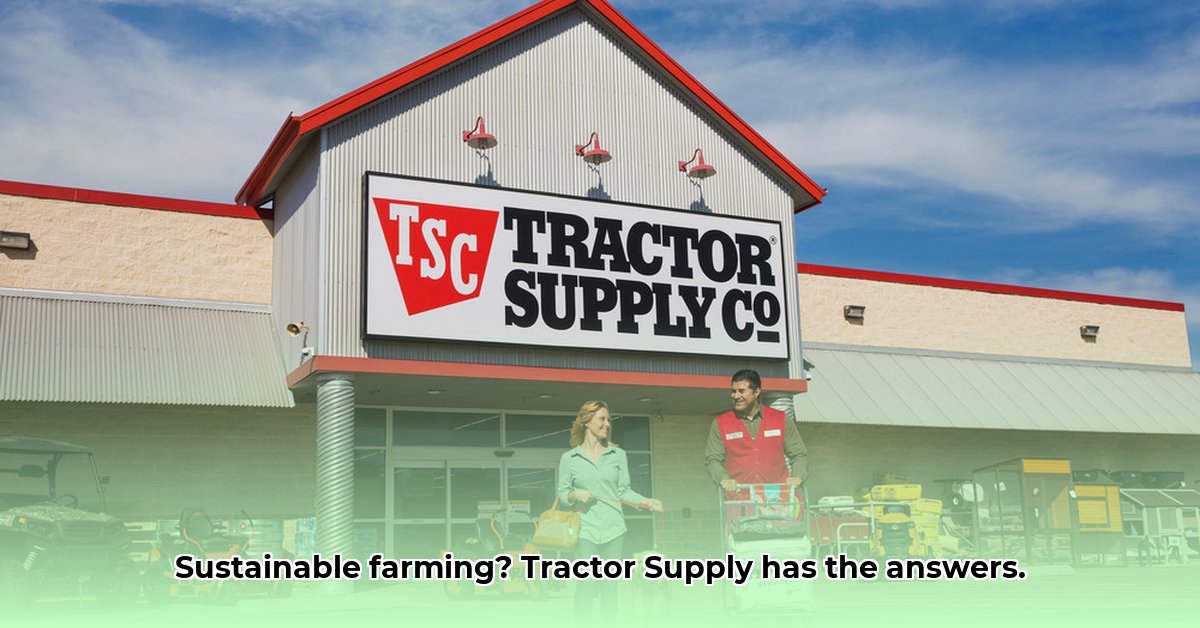
Current State of Tractor Supply's Sustainability Efforts in Bay St. Louis
Tractor Supply Company (TSC) in Bay St. Louis, Mississippi, situated conveniently on Highway 90, serves a substantial agricultural community. However, the extent of its contribution to sustainable farming practices remains unclear. While the store offers a range of agricultural products, a comprehensive assessment of its sustainability is hampered by a lack of readily available data. This article investigates TSC's current efforts, identifies critical data gaps, and proposes actionable steps to foster greater sustainability in the region. For more information on sustainable fertilizers, see this resource.
The Missing Pieces: A Lack of Transparency
Information regarding TSC's commitment to sustainable agriculture in Bay St. Louis is limited. Concrete data on the availability and sales of eco-friendly products—such as organic seeds, water-efficient irrigation systems, or environmentally sound pest control solutions—is scarce. This lack of transparency hinders a thorough evaluation of their actual impact on local sustainable farming practices. Transparency in sourcing and production methods is crucial for informed consumer choices and for assessing the true environmental impact. Without detailed information, it's difficult to determine the degree to which TSC is actively supporting sustainable practices.
Untapped Potential: A Significant Opportunity
Despite the limited data, TSC's Bay St. Louis location possesses considerable potential to significantly advance sustainable agriculture in the region. Increased availability of sustainable products would empower local farmers to adopt eco-friendlier methods, leading to environmental benefits and improved farm practices. This transition could lead to improved soil health, reduced water consumption, and decreased reliance on harmful pesticides. The potential positive impact on the local ecosystem and the broader community is significant, requiring a strategic initiative to unlock this potential.
Actionable Steps Toward a Greener Future
Achieving greater sustainability requires a collaborative and multi-pronged approach involving TSC, farmers, consumers, and regulators:
TSC's Internal Assessment: TSC should conduct a comprehensive internal review of its product supply chains, prioritizing sustainable sourcing and production methods. Clear metrics should be established to track progress towards sustainability goals. This should include transparent reporting on sustainability initiatives and outcomes to build trust and accountability.
Farmer Engagement: Direct engagement with local farmers through surveys, focus groups, and open forums is essential to understand their needs and preferences regarding sustainable products. This feedback is vital in guiding TSC's product selection and inventory management.
Consumer Education and Advocacy: Consumers can play a significant role in driving demand for sustainable products. Educating consumers about the environmental and economic benefits of sustainable practices will create greater market demand.
Collaboration and Partnerships: TSC should actively collaborate with local government agencies, non-profit organizations, and agricultural extension services to promote sustainable agricultural practices. Joint initiatives can amplify the impact and create tangible results.
Regulatory Compliance: A thorough understanding of local, state, and federal regulations regarding sustainable agriculture is essential. TSC must ensure full compliance with these provisions and actively seek opportunities to exceed minimum criteria.
Risk Assessment and Mitigation
Several potential risks hinder TSC's progress toward sustainability:
| Risk Factor | Likelihood | Impact | Mitigation Strategy |
|---|---|---|---|
| Limited sustainable product offerings | High | High | Expand sustainable product lines based on farmer feedback and market research. |
| Lack of farmer awareness | High | Moderate | Targeted marketing campaigns and educational workshops. |
| Competition from other stores | Moderate | Low | Focus on superior customer service, expert advice, and community engagement. |
| Supply chain environmental impact | Moderate | Moderate | Explore sustainable shipping and delivery options, prioritizing local sourcing where feasible. |
Regulatory Landscape and Future Investigation
Understanding the specific regulations concerning sustainable agriculture in Bay St. Louis is crucial. Further investigation into local, state, and federal environmental regulations, including labeling requirements and pesticide usage restrictions, is necessary to ensure TSC's compliance and informed decision-making. This includes analyzing potential incentives or penalties associated with compliance with sustainable agricultural practices.
Conclusion: A Path Forward
Tractor Supply's Bay St. Louis location holds significant potential to foster sustainable agricultural practices. However, realizing this potential requires transparency, collaboration, and a data-driven approach. The actionable steps outlined above, combined with continuous research and engagement with all stakeholders, will pave the way for a greener future for Bay St. Louis’ farming community. Further investigation and ongoing monitoring are crucial to assess the long-term impact of these efforts.
Tractor Supply Bay St Louis
Content about tractor supply bay st louis (Auto-generated fallback due to API error).